Types Of Court Marriages in India
Hindu Marriage/ Arya Samaj Marriage
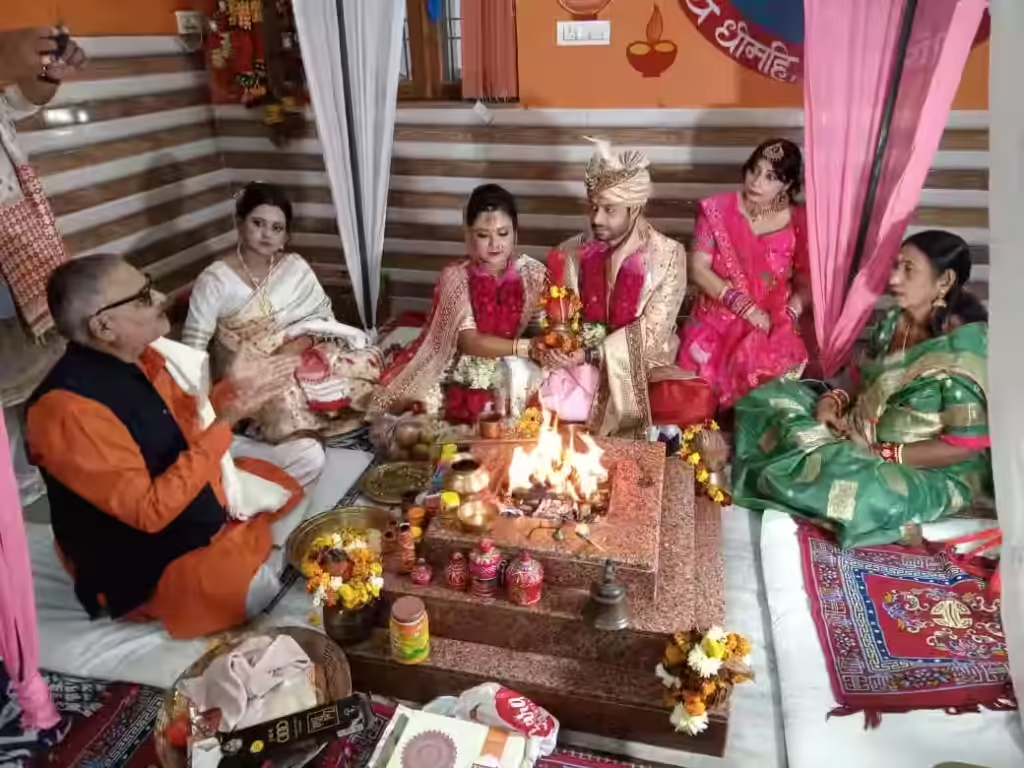
Arya Samaj Marriage are fairly simple to carry out, and the ceremonies themselves are pretty straightforward. It can be performed by couples of different religions who belong under the large umbrella of Hindus in India. This is usually the preference for couples where one spouse practices Buddhism, Jainism, or Sikhism. Validation Act of 1937 under the Hindu Marriage Act of 1955.
Arya Samaj Marriage in India
It is a monotheistic Indian Hindu reform movement based on the belief that the Vedas are infallible. The sannyasi Dayanand Saraswati founded the samaj on 7 April 1875. It was the first Hindu organisation to introduce proselytisation.
Two Types of Marriage Registrations
When registering an Arya Samaj marriage, couples have two options: the Hindu Marriage Act, 1955, and the Special Marriage Act, 1954.
Under the Hindu Marriage Act, 1955
This act is for Hindus, Sikhs, Jains, and Buddhists. To register, visit the sub-registrar’s office in the area where the marriage took place or where one partner has lived for at least six months. Even if the marriage has already been performed according to traditional rituals, you can still register it under this act.
Under the Special Marriage Act, 1954
This act is open to all Indian citizens, regardless of religion. To register, the couple must give a 30-day notice to the sub-registrar in the area where either partner resides. The notice will be displayed publicly for 30 days. If there are no objections, the marriage is registered. This process does not require any religious ceremony, making it a suitable option for couples who do not qualify for registration under the Hindu Marriage Act.
Who is Eligible for an Arya Samaj Marriage?
- The groom’s minimum age has to be 21 whereas the bride should be 18 years of age.
- Any person who is a Hindu, Buddhist, Jain, or Sikh can perform Arya Samaj Marriage
- Inter-Caste Marriages and Inter-Religious Marriages are eligible in an Arya Samaj Marriage. But none of the marrying persons should be Muslim, Christian, Parsis or Jews.
- If a non-Hindu couple would like to perform the marriage, the Samaj allows them to convert through Shuddhi.
| Note – Muslims, Christians, Parsis or Jews, if, out of their free will and consent, are ready to convert and embrace the Hindu Religion, the Arya Samaj Mandir performs a ritual called Shuddhi. Shuddhi means purification for such conversion, and thereafter, such a convert can perform Arya Samaj Marriage. |
6 Step Procedure for Arya Samaj Registration
To register your Arya Samaj marriage, follow these six simple steps:
Step 1: Book an Appointment
First, book an appointment with the sub-divisional magistrate’s office in your area. This is where you will receive your marriage certificate. Make sure to book the appointment at least 15 days before your wedding date.
Step 2: Fill Out the Registration Form
Next, fill out the marriage registration form. This form will ask for details about the bride and groom, such as names, ages, addresses, and religions. You can get this form from the magistrate’s office or download it from their website.
Step 3: Submit the Form and Required Documents
Submit the completed form along with the necessary documents. These include proofs of date of birth, identity, address, and religion, as well as photographs. A small fee is also required for the registration process.
Step 4: Bring Two Witnesses
On the day of your appointment, bring two witnesses who know you and your partner well. They should have their identity proofs with them and will need to sign the form as witnesses to your marriage.
Step 5: Verification
The sub-divisional magistrate will verify all the details and documents you have provided. This step ensures that all information is accurate and complete.
Step 6: Receive Your Marriage Certificate
Finally, after verification, you will receive your marriage certificate from the sub-divisional magistrate. This certificate is a legal document that confirms your marriage according to Arya Samaj rules.
Consequently, after fulfilling all the formalities, the magistrate’s office will grant the marriage certificate, which is recognised as legally valid by the court.
Free Consultation
Inter-Religion Marriage
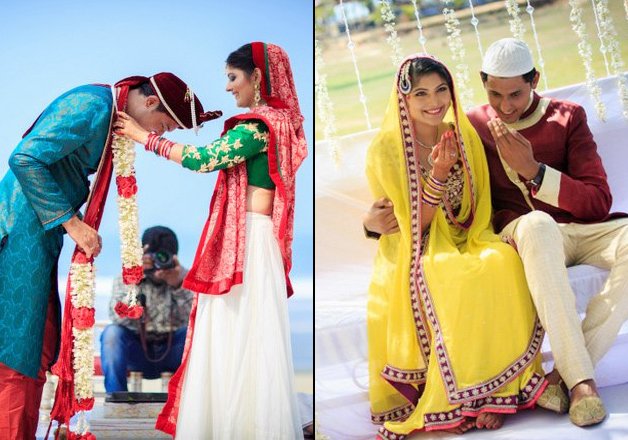
Marriages between different castes and religions are frowned upon in India. In other countries, it’s even considered inappropriate. To maintain the rigid power systems that are still in place in the country, people are expected to marry within their clans, classes, or religions. Additionally, for a marriage to be legally recognized and registered, certain customs and ceremonies specific to each religion and caste must be observed.
To safeguard the rights of people who defy social norms and prefer to marry outside their caste or religion, the Special Marriage Act of 1954 was created. This provides a special style of marriage for citizens of India and Indian nationals living abroad, regardless of caste or religion.
People go above and beyond to make sure that their families’ weddings are fully commemorated. While planning the wedding and having fun, it is equally important to register the marriage legally in our nation. This will generate a marriage certificate that the couple will require for all joint endeavors, such as purchasing property or obtaining a spouse visa for travel overseas.
In this blog, we will talk about the registration procedure for inter-religion marriages under the Special Marriage Act in India. Read on to know more.
What Is Covered Under the Act?
To facilitate inter-caste and inter-religion marriage in which neither party had to renounce their religion in order to wed the other, the Special Marriage Act was established. While maintaining their religious affiliation, they can still register.
This law applies to marriages between Hindus, Muslims, Christians, Sikhs, Jains, and Buddhists. And it applies to every Indian, whether they are living in India or overseas, except the state of Jammu & Kashmir. There is a regular procedure for marriage, regardless of your religion, rather than a specific court for marriages between persons of different religions.
The Special Marriage Act’s Process
Unlike traditional marriages, the Special Marriage Act does not call for extravagance, ceremony, or spectacle. All that is required for a Marriage Registration to be considered legitimate under this Act is the consent of both parties to the wedding. If both parties are willing to get married, it will work.
The Special Marriage Act outlines the following stages for registering and getting married:
- You must submit a written application to the district marriage registrar where either party has resided for the previous 30 days
- Before considering any opposition to the intended couple’s marriage, the marriage officiant gives the couple a 30-day notice
- If there are no objections, the marriage officer is required to maintain a marriage notice book with all the details of the intended union. If there are no objections, the marriage may be solemnized after 30 days have passed after the notification was placed at the marriage commissioner’s office
- The couple and three witnesses must acknowledge the marriage officer’s entry of all relevant information in the marriage notice book.
What Happens in the Event of a Marital Objection
- The marriage officiant can investigate the validity of the objection;
- The marriage officiant can investigate the validity of the objection.
Conditions for Solemnising the Marriage
Here are a few conditions that are applicable by the law to solemnize a marriage under the Special Marriage Act in India:
- The parties must also consent to the marriage before the registrar and three witnesses for it to be deemed valid
- The bride must be at least 18 years old, and the groom must be at least 21 years old when they get married. According to Indian law, a boy or girl must be at this age to get married
- Both parties must be faithful at the moment of marriage, meaning they must be single and without a spouse still alive
- The parties must not be connected or fall into a category of banned relationships for them to be allowed to decide for themselves whether they wish to get married
- If so, there would be a reason to dissolve the marriage. Nevertheless, a marriage under a banned relationship may still be solemnized if one of the partners’ customs permits it.
However, it should be noted that connections with cousins, including paternal and maternal, are forbidden relationships under Schedule I and Schedule II of the Act. According to several religions, things are viewed differently.
Free Consultation
Muslim Court Marriage
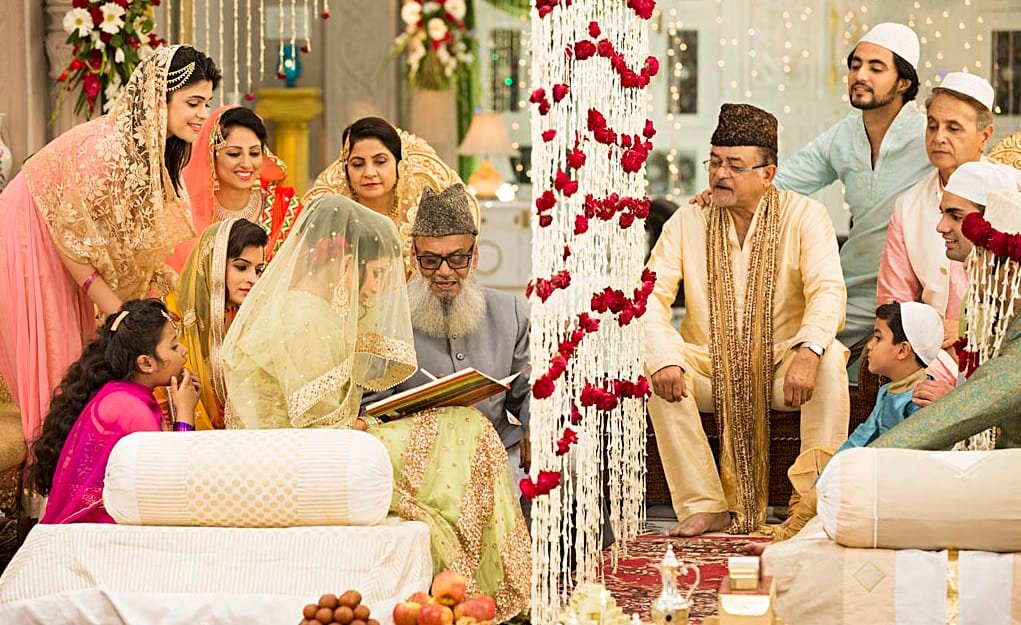
Muslim law is a civil law system that remains tacit. Marriage is a civil contract without any prescribed religious ceremony in this legal framework. The union between the bride and groom is established through an arrangement called Nikah, derived from the Arabic term for ‘contract.’ The Quran explicitly describes marriage as ‘Mithaqun Ghalithun,’ emphasising its nature as a robust agreement. The original purpose of Nikah was to facilitate the physical relationship between a man and a woman for procreation. Additionally, the concept of mahr ensures that women are honoured and provided with a marital gift.
Muslim law encompasses a rich combination of codified and uncodified sources, including the Quran, Sunnat, Ijma, Qiyas, customs, legislation, precedents, and principles of equity and justice.
Within the Sunni branch, there are four primary schools of thought:
- Hanafi
- Maliki
- Shafi’i
- Hanbali
The Shia branch, on the other hand, comprises three significant schools of thought:
- Ithna-Ashari
- Ismaili
- Zaidi
In India, the Hanafi School of Islamic law holds a dominant position, shaping the legal landscape within the Muslim community. It is through the collective influence of these diverse sources and schools of thought that Muslim law continues to evolve and adapt to the changing needs of society.
Why Register Under the Muslim Marriage Act?
As per Ameer Ali, marriage is a sacred institution established to safeguard society and protect individuals from indecency and immorality. Marriage, also known as wedlock, is a civil contract known as Nikah. This contract is entered into by the parties involved with the purpose of mutual benefit, as outlined by the Shariat. Its primary aim is to legalise the union between a man and a woman, ensuring that any children born from this union are considered legitimate. In Islamic law, a written document is not mandatory to validate the marriage contract.
However, a valid contract is essential for a Muslim marriage. The following are the objectives of a marriage.
- The legitimisation of sexual relations.
- The bearing and raising of children.
- The continuation and preservation of the human race.
- The regulation and organisation of social life.
Muslim marriage is fundamentally based on a contractual agreement and is regarded as a religious obligation. It is an act of worship known as Sunnat-Muwa-Akidah. Prophet Muhammad (PBUH) emphasised that those financially capable of supporting a wife and fulfilling the dower should enter into marriage. The key elements of Muslim marriage bear striking similarities to those found in a civil contract.
Muslim Marriage Registration Process
According to Muslim Law, the registration of marriage is not deemed mandatory. However, certain states such as Assam, Punjab, Bengal, Bihar, and Orissa have enacted laws requiring the registration of Muslim marriages. While registration is not a prerequisite for a valid Muslim marriage, it is authentic proof of the union.
In the case of Seema v. Ashwani Kumar, the Supreme Court ruled that the marriage of Indian citizens, regardless of their religion, should be registered in the state where the marriage occurred. Similarly, in the case of M. Jainoon v. Amanullah Khan, the Madras High Court stated that although registration is not obligatory under Muslim personal law, it cannot be said to be prohibited either.
Documents Required for Muslim Marriage Registration
As the Nikah is regarded as a contractual agreement, it involves the payment of consideration in the bride’s name. The legal document that outlines the terms of the Muslim marriage is known as a nikah-nama.
Below is the list of documents required for Muslim marriage registration:
- Aadhar card, Pan card, and two passport-size photographs of the bride and groom.
- Invitation card and photographs from the wedding function.
- 10th and 12th-grade marksheets.
- Birth certificates.
- Copy of passport for foreign nationals (if applicable).
- Valid Visa for foreign nationals (if applicable).
- Divorce decree certificate (if applicable) for individuals who are divorced.
Free Consultation
Foreign Court Marriage
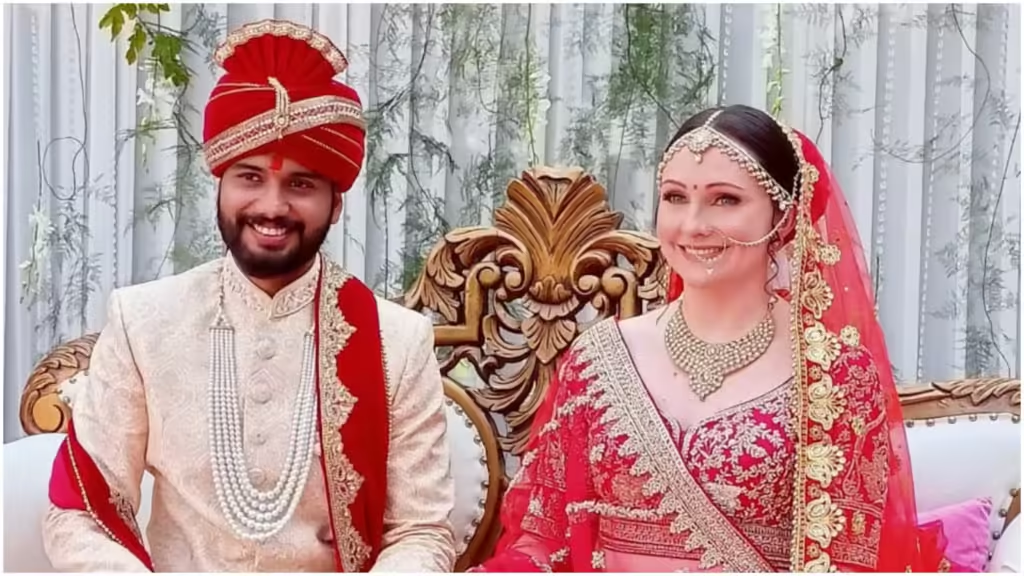
Criteria for Court Marriage Registration Between Indian and Foreigner
- The female should be of at least eighteen years of age and the groom should be of twenty-one years of age.
- Both the parties must not have any subsisting valid marriage with another person. They should either be single, divorced, or widowed.
- The bride and the groom should not fall under the degree of prohibited relationship as stated in the Special Marriage Act, 1954.
- Both the parties should not be of unsound mind such that they can’t consent to the marriage. They shouldn’t be suffering from any mental illnesses that have affected them to such an extent that it makes them unfit for marriage and the procreation of children. They also shouldn’t have been facing recurrent attacks of insanity.
Documentations for Court Marriage in India
- A document stating the date of birth of the male and the female. You can use a passport, matriculation certificate, or birth certificate as evidence of your date of birth.
- The groom and the bride need to fill out the application form and sign them
- A document that can be used to prove that either the bride or the groom has stayed in Delhi for over 30 days. You could present a report from the concerned Station House Officer or a ration card for this purpose.
- You need to present a receipt that shows you have paid the required fees for the application form in the District Court.
- You need to have an affirmation that proves you are not related to each other. It should state that you are unrelated to each other within the scope of the prohibited relationship as stated in the Special Marriage Act.
- Affidavits of both the bride and the groom which show the date of birth, and their current marital status whether they are single, divorcee, or widower.
- If either party is divorced, they would need to produce a divorce decree or order for a online court marriage. If either the groom or the bride is a widower or a widow, they would need to present the death certificate of the spouse.
- Both the parties need to present two copies of passport-size pictures after getting them duly attested by any gazetted officer.
Additional documents for Court Marriage with Foreign National
Below given are the documents required for Court Marriage with Foreign National in India:
- The foreign national would need to present a marital status certificate from their embassy or a certificate of NOC.
- A photocopy of their visa and passport.
- Either the bride or the groom needs to show a document that proves that they have stayed in India for a month or more. They can use a report from the concerned SHO or present proof of residence.
Free Consultation
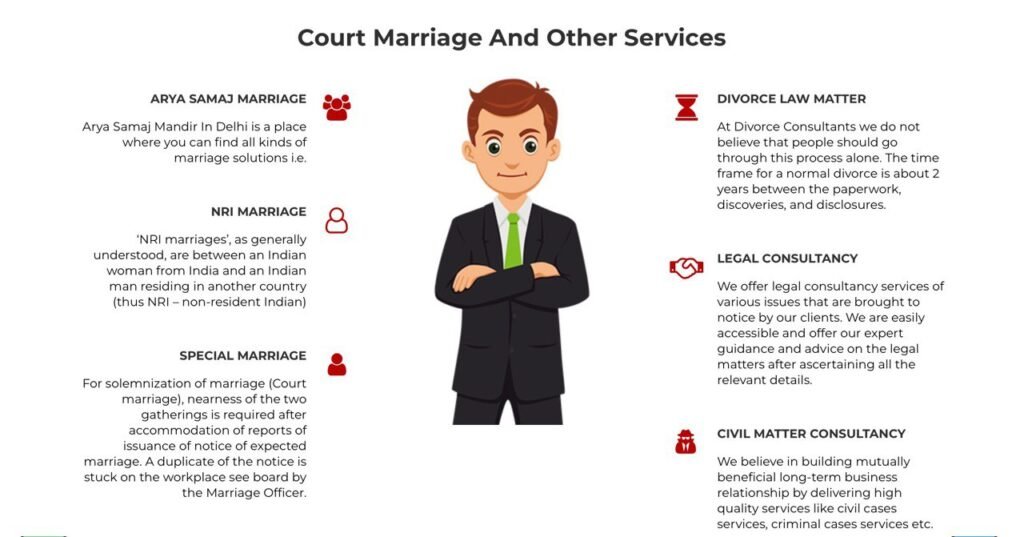
Free Consultation
